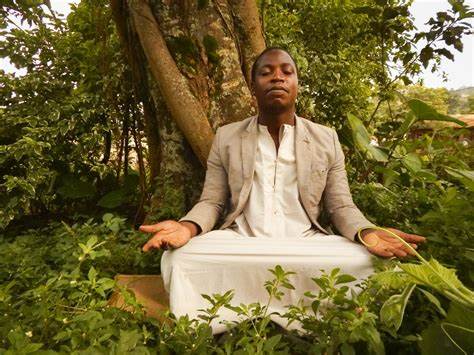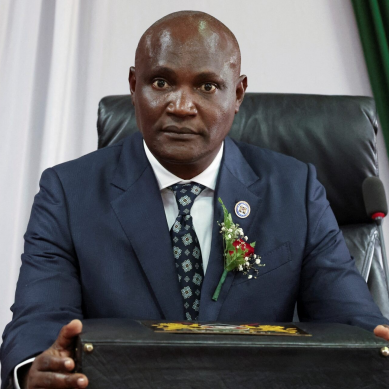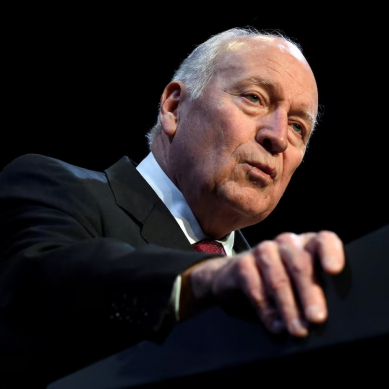
White spiritualism is not spiritualism at all but rather gentrification that allows privileged people to profit from oppressed people’s labour. I’m not saying that white people should not explore spiritualism; however, it is crucial that we listen to voices within closed practices and minority communities. Not everything belongs to everyone and those boundaries should be respected and celebrated (Kouatrli,2021).
Indigenous African spirituality and religions
Indigenous African religions refer to the indigenous or native religious beliefs of the African people before the Christian and Islamic colonisation of Africa. Indigenous African religions are by nature plural, varied and usually informed by one’s ethnic identity, where one’s family came from in Africa. Indigenous African spirituality today is increasingly falling out of favour. The number of devotees to indigenous practices has dwindled as Islam and Christianity have both spread and gained influence throughout the continent. Although larger religions have made big inroads, traditional belief systems, which are based on openness and adaptation, endure (Chiorazzi, 2015).
The success of Christianity and Islam on the African continent in the last 100 years has been extraordinary, but it has been, unfortunately, at the expense of African indigenous religions,” said Jacob Olupona – a professor of indigenous African religions at Harvard Divinity School and professor of African and African-American studies in Harvard’s Faculty of Arts and Sciences (Prof. Olupona cited by ChiorazzI (2015).
Since 1900, Christians in Africa have grown from approximately seven million to over 450 million today. Islam has experienced a similar rapid growth. African spirituality has always been able to adapt to change and allow itself to absorb the wisdom and views of other religions, much more than, for example, Christianity and Islam. While Islam and Christianity tend to be overtly resistant to adopting traditional African religious ideas or practices, indigenous African religions have always accommodated other beliefs (Jacob Olupona, cited by Chiorazzi, 1915).
Christianity and Islam are gradually creating a social identity in Africa that cuts across these indigenous African religious and social identities. They do this by having Africans increasingly identify themselves as either Muslim or Christian, thus denying their unique African worldview that has always viewed – as evidenced in their creation myths – everything as unified and connected to the land, the place were one’s clan, lineage and people were cosmically birthed. Foreign religions simply don’t have that same connection to the African continent (Chiorazzi, 2015, citing Prof Olupona).
African spirituality simply acknowledges that beliefs and practices touch on and inform every facet of human life, and therefore African religion cannot be separated from the everyday or mundane.
“The role of ancestors in the African cosmology has always been significant. Ancestors can offer advice and bestow good fortune and honour to their living dependents, but they can also make demands, such as insisting that their shrines be properly maintained and propitiated. If these shrines are not properly cared for by the designated descendant, then misfortune in the form of illness might befall the caretaker. A belief in ancestors also testifies to the inclusive nature of traditional African spirituality by positing that deceased progenitors still play a role in the lives of their living (Chiorazzi, 2015, citing Prof Olupona).
It is not a closed theological system. It doesn’t have a fixed creed, like in some forms of Christianity or Islam. Consequently, traditional Africans have different ideas on what role the ancestors play in the lives of living descendants. Some Africans believe that the ancestors are equal in power to deities, while others believe they are not. The defining line between deities and ancestors is often contested, but overall, ancestors are believed to occupy a higher level of existence than living human beings and are believed to be able to bestow either blessings or illness upon their living descendants.
Indigenous African spiritual beliefs are not bound by a written text, like Judaism, Christianity and Islam. Indigenous African religion is primarily an oral tradition and has never been fully codified; thus, it allows itself to more easily be amended and influenced by other religious ideas, religious wisdom, and by modern development. Holding or maintaining to a uniform doctrine is not the essence of indigenous African religions. If we were to lose indigenous African religions in Africa, then diviners would disappear and if diviners disappeared, we would not only lose an important spiritual specialist for many Africans, but also an institution that for centuries has been the repository of African history, wisdom, and knowledge.
Diviners – who go through a long educational and apprenticeship program – hold the history, culture, and spiritual traditions of the African people (Prof. Olupona, cited by Chiorazzi, 2015)
If we lose traditional African religions, we would also lose or continue to seriously undermine the African practice of rites of passage such as the much-cherished age-grade initiations, which have for so long integrated and bought Africans together under a common understanding or worldview. These initiation rituals are already not as common in Africa as they were only 50 years ago, yet age-grade initiations have always helped young Africans feel connected to their community and their past. They have also fostered a greater feeling of individual self-worth by acknowledging important milestones in one’s life, including becoming an adult or an elder (Prof. Olupona cited by Chiorazzi, 2015).
In conclusion, religion and spirituality offer distinct paths to truth, with religion being more structured and faith-based, while spirituality is personal and flexible Religion and spirituality offer distinct paths to truth, with religion being more structured and faith-based, while spirituality is personal, flexible, and centred on inner growth. Both can guide you on your journey of awakening, and the choice is a subjective expression of your path.
However, continuing spiritual colonialism, spiritual conquests within the contexts of globalisation and pursuit of power at the exclusion of others by people with exogenous roots using religio-politics as a pathway of domination, threaten to continue eroding the African religious and spiritual and spiritual institutions were and must continue to be the repository of African history, wisdom, and knowledge and values if Africans are to continue surviving as a unique as people on the globe. Unfortunately, in Uganda, the rulers have chosen continuation of spiritual colonialism, spiritual neocolonialism and spiritual conquests simultaneously with whole sale endorsement of globalisation as Uganda’s pathway to development in the 21st century.
Globalisation is entrenching the erosion the erosion of our unique spiritual and religious values, which is what the global geopolitical and geoeconomic forces desire to further penetrate Uganda, dominate and exploit her. With the recent discovery that Busoga is the richest in gold and rate earth minerals in the Great Lakes region, such forces will operate more aggressively with the help of a greedy, selfish and corrupt ruling class that is not so forward-looking.
If the Maoris of New Zealand, Aboriginals of Australia and Red Indians of the Americas were reduced to insignificance by invasive refugees from Europe, some as exported criminals, the process of reduction of the indigenous communities to insignificance by refugees and former refugees to insignificance will be achieved even faster through the combination of spiritual colonialism, spiritual neocolonialism and spiritual conquests and other types colonialism neocolonialism and conquests, mediated by globalisation.
As Professor Olupona, cited by Chiorazzi (2015). put it “The sky is large enough for birds to fly around without one having to bump into the other.”.
For God and my country
- A Tell report / By Oweyegha-Afunaduula / Environmental Historian and Conservationist Centre for Critical Thinking and Alternative Analysis (CCTAA), Seeta, Mukono, Uganda.
About the Centre for Critical Thinking and Alternative Analysis (CCTAA)
The CCTAA was innovated by Hyuha Mukwanason, Oweyegha-Afunaduula and Mahir Balunywa in 2019 to the rising decline in the capacity of graduates in Uganda and beyond to engage in critical thinking and reason coherently besides excellence in academics and academic production. The three scholars were convinced that after academic achievement the world outside the ivory tower needed graduates that can think critically and reason coherently towards making society and the environment better for human gratification. They reasoned between themselves and reached the conclusion that disciplinary education did not only narrow the thinking and reasoning of those exposed to it but restricted the opportunity to excel in critical thinking and reasoning, which are the ultimate aim of education. They were dismayed by the truism that the products of disciplinary education find it difficult to tick outside the boundaries of their disciplines; that when they provide solutions to problems that do not recognise the artificial boundaries between knowledges, their solutions become the new problems. They decided that the answer was a new and different medium of learning and innovating, which they characterised as ‘The Centre for Critical Thinking and Alternative Analysis’ (CCTAA).
For further reading
Arnel, B. (2023). Colonialism Versus Imperialism. Polit Theory, 2023 Sep 9;52(1):146–176. doi: 10.1177/00905917231193107 https://pmc.ncbi.nlm.nih.gov/articles/PMC10844002/ Visited on 17 December 2024 at 18:08 pm EAT
Barnard, Malcolm (2020). Globalisation and Colonialism. Chapter In Book Fashion Theory. Taylor and Francis Group, https://www.taylorfrancis.com/chapters/edit/10.4324/9781315099620-67/globalization-colonialism-malcolm-barnard Visited on 18 December 2024 at 12:12 2024 at 12:12pm EAT
Brown, L. B. (1981). The religionism factor after 25 years. The Journal of Psychology: Interdisciplinary and Applied, 107(1), 7–10. https://doi.org/10.1080/00223980.1981.9915197
ChiorazzI, Anthony (2015). The spirituality of Africa. The Havard Gazette, 6 October 2015. https://news.harvard.edu/gazette/story/2015/10/the-spirituality-of-africa/ Visited on 12 October, 2024.
Chiwanza, Takudzwa Hillary (2022). Was Religion a Tool for Colonialism in Africa? Africa Rebirth, January 10 2022. https://www.africarebirth.com/was-religion-a-tool-for-colonialism-in-africa/ Visited on 18 December 2024 at 11.44am EAT
Christopher Buck and Kevin Lock (2019). Bahai Teachings Org, June 30 2019. Indigenous Spiritual Traditions and Cultural Colonialism.
Ding Gang (2024). Reflecting on the Spiritual Blunder of Colonialism. Global Times, December 2024. https://www.globaltimes.cn/page/202412/1324369.shtml Visited on 18 December 2024 at 11.24am EAT.
Frank Blanco Chris Leyva Dave Nicklaw Ben Winton (2006). The globalisation of religion. McCormack_Sample-Simulation-1.pdf https://oakland.edu/Assets/upload/docs/AIS/Syllabi/McCormack_Sample-Simulation-1.pdf Visited on 18 December 2024 at 13:04pm EAT
Hull, J. M (1999). Spiritual and Religious Education. Routledge. https://www.taylorfrancis.com/chapters/edit/10.4324/9780203984093-16/religionism-religious-education Visited on 12 October 2024 at 11:38am EAT
Jagire, J.M. (2011). Spirit Injury: The Impact of Colonialism on African Spirituality. In: Spirituality, Education and Society: An Integrated Approach. E-Book ISBN: 9789460916038 Publisher: Brill. Print Publication Date: 01 Jan 2011, https://brill.com/display/book/edcoll/9789460916038/BP000014.xml Visited on 18 December 2024 at 10.48am EAT.
Jo O’Donoghue (1993). Historical Themes, Missionary Endeavour and Spiritual Colonialism in Brian Moore’s Black Robe. Studies: An Irish Quarterly Review Vol, pp. 131-139 (9 pages) Published By: Messenger Publications.
Kamau, Edwin (2024). Oweyegha-Afunaduula: The Religiopolitics of The Universal Apostles Fellowship Church of Righteousness (of Daudi Isinga). Ultimate News, September 17 2024 https://ultimatenews.co.ug/2024/01/oweyegha-afunaduula-the-religio-politics-of-pastor-bugingo/ Visited on 20th December 2024 at 13:24 pm EAT.
Kouatli, Zaynab (2021). White Spiritualism is modern day Colonisation. The Wayne Stater, September 8 2021. https://thewaynestater.com/21261/opinion/white-spiritualism-is-modern-day-colonization/ Visited on 12 December 2024 at 13: 25.
Lodigiani, Irene (2020). From Colonialism to Globalisation: How History Has Shaped Unequal Power Relations Between Post-Colonial Countries. GLOCALISM: JOURNAL OF CULTURE, POLITICS AND INNOVATION 2020, 2, DOI: 10.12893/gjcpi.2020.2.12 https://glocalismjournal.org/wp-content/uploads/2020/11/Lodigiani_gjcpi_2020_2.pdf Visited on 18 December 2024 at 12.03pm EAT
Mikander, Pia. (2018). “Globalization as Continuing Colonialism? Critical Global Citizenship Education in an Unequal World.” University of Helsinki, June 2016.
Naidu M.V. (1992). Religionism, rationalism and peace education: an attempt at model building. Peace Research Vol, pp. 1-15 (15 pages) Published By: Canadian Mennonite University.
Niall Finneran, Christina Welch (2024). Materialities of Religion: Spiritual Traditions of the Colonial and Neocolonial Caribbean. Routledge. https://www.routledge.com/Materialities-of-Religion-Spiritual-Traditions-of-the-colonial-and-post-colonial-Caribbean/Finneran-Welch/p/book/9781032575346?srsltid=AfmBOoqhgLzN4BVCDGuQVopjO0rrcIEdW5IHRFNbroikuFKwhEpTrwnf Visited 18 December 2024 at 11.15 am EAT.
Njoroge, Linda (2024). Oweyegha-Afunaduula: The Religiopolitics of Pastor Bugingo. Ultimate News, January 6 2024, https://ultimatenews.co.ug/2024/01/oweyegha-afunaduula-the-religio-politics-of-pastor-bugingo/ Visited on 20 December 2024 at 13:17 EAT
Oweyegha-Afunaduula (2023). The New Imperialism in Uganda: Primitive Accumulation by Dispossession. Ultimate News, February 1 2023, https://ultimatenews.co.ug/2023/02/oweyegha-afunaduula-the-new-imperialism-in-uganda-primitive-accumulation-by-dispossession/ Visited on 18 December 2024 at 10.08 am.
Oweyegha-Afunaduula, 2023). Uganda’s Craze for Modernisation Where None Has Ever Been. The Kampal Report, 10 July 2023. https://www.thekampalareport.com/talk-back/2023071028838/oweyegha-afunaduula-ugandas-craze-for-modernisation-where-none-has-ever-been-modern.html Visited on 18 December 2023 at 12:57 pm EAT.
Oweyegha-Afunaduula (2024). Role of Pro-political regime pastors in de-democratisation. Sunday Monitor, December 8 2024, https://www.monitor.co.ug/uganda/magazines/people-power/role-of-pro-political-regime-pastors-in-de-democratisation-4849938#story Visited on 20 December 2024 at 13.31pm EAT
Raj Kumar Sharma (2018). Globalisation as politics of Neo-colonisation: Teaching English Language in Higher Education in Nepal. Journal of NELTA Surkhet Vol. 5 January, 2018
Ravi Dutt Bajpai, Swati Parashar (2023). Worlding Encounters: Indian Spirituality and Anti-Colonialism in the Life and Thoughts of “the Mother” (Mirra Alfassa), Global Studies Quarterly, Volume 3, Issue 1, January 2023, ksad014, https://doi.org/10.1093/isagsq/ksad014 Visited on 18 December 2024 at 10.54am EAT
Reddit (?) The New Age of Religious Appropriation and Spiritual Colonialism https://www.reddit.com/r/DankPrecolumbianMemes/comments/ti4cu0/the_new_ageof_religious_appropriation_and/?rdt=36725 Visited on 12 December 2024 at 13:46pm EAT
Richa Tiwari (2023). Religion versus Spirituality. Understanding the Difference. Linkedin, September 23 https://www.linkedin.com/pulse/religion-vs-spirituality-understanding-difference-richa-tiwari/ Visited 12 December 2024 at 11:58.
Salerno, Thomas (2021). Evangelisation is Colonialism: Are We Sure About That? https://www.wordonfire.org/articles/evangelization-is-colonialism-are-we-sure-about-that/ Visited on 18 December 2024 at 11.38 am EAT
Takudzwa Hillary Chiwanza (2022). Was Religion a Tool for Colonialism in Africa.? Africa Rebirth, January 10 2022 https://www.africarebirth.com/was-religion-a-tool-for-colonialism-in-africa/ Visited on 1 December 2024 at 13: 39pm. EAT
Thompson, P. (1993). Religionism: a response to John Hull. British Journal of Religious Education, 16(1), 47–50. https://doi.org/10.1080/0141620930160107
TwoTwoOne (2023). Globalisation as a Continuation of Colonisation. TwoTwoOne, May 15 2023, https://twotwoone.nyc/globalization-as-a-continuation-of-colonization/ Visited on 18 December 2024 at 12.26pm EAT
Rehman Anwar (2022). Spiritual Colonialism. The Alphe Review, October 2022. https://www.thealephreview.com/post/spiritual-colonialism Visited on 12 October, 2022.
Riegert, Jack (2019). Neocolonialism and Globalisation: The Dual Phenomena of Exploitation and Underdevelopment in Modern Africa. Scholarship Works Bowling Green State University (BGSU), https://scholarworks.bgsu.edu/cgi/viewcontent.cgi?article=1152&context=africana_studies_conf Visited on 18 December 2024 at 12:33pm EAT
Yermoshkin, N. (1984). Spiritual Neocolonialism. Amazon. https://www.amazon.com/Spiritual-Neo-colonialism-N-Yermoshkin/dp/B00IX5PP9U Visited on 18 December 2024 a 11.34 am EAT







